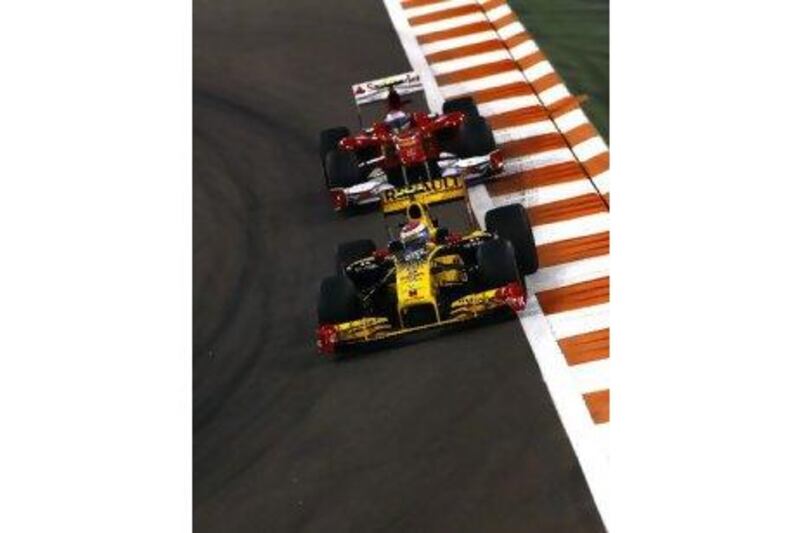SHANGHAI // Just six months after Yas Marina Circuit was subject to criticism for providing a processional end to the Formula One season, the sport's fraternity yesterday incongruously deemed plans by organisers to change the layout of the track for this year's Abu Dhabi Grand Prix to be wholly unnecessary.
Following the UAE capital's season-ending weekend in November, the Hermann Tilke-designed circuit was subject to scrutiny by the Federation Internationale de l'Automobile (FIA), the world governing body.
Fernando Alonso, the Ferrari driver chasing a third world championship title, had been unable to pass Renault's Vitaly Petrov, despite being behind the wheel of a vastly superior car. The situation was condemned by Jean Todt, the president of the FIA, who said it was "not acceptable". He later deployed the Circuit Design Group to "examine [and] identify the possibility of increasing the opportunities for overtaking" at several tracks, including Yas Marina.
Richard Cregan, the chief executive at Yas Marina Circuit, has remained adamant throughout that the track is free of blame, but confirmed to The National last week that alterations will be implemented ahead of this year's race on November 13.
Michael Schumacher and Rubens Barrichello yesterday led the praise for the organisers' willingness to act upon driver feedback, but also stressed new rule changes appear to have already solved F1's overtaking conundrum.
"We saw last year in the last race with Fernando and Vitaly the reason why it comes into discussion," said Schumacher, Mercedes-GP's seven-time world champion. "As much as the teams in Formula One have worked on the cars, there was probably a need to have circuits in general - not just Abu Dhabi - to make revisions in order to allow overtaking."
It is understood Abu Dhabi race organisers, following discussions with Charlie Whiting, the FIA's F1 race director, will this summer widen the "S-turns" before the track's two long straights, allowing cars to pass through simultaneously.
"There are some interesting views and we're very happy to hear that Abu Dhabi, after building a very good track, is open to make further changes in order to see if we can find some guidelines for the future that may improve the overtaking situation," Schumacher said.
"It's a good step in the right direction.
"Nevertheless, if you look at this year's competition in general, it offers a lot more overtaking possibilities, and in that respect, in terms of spectacle and interest, it has risen and it's very pleasing to see."
Barrichello, the veteran Williams driver and head of the Grand Prix Drivers' Association, said he welcomed the alterations, but added the introduction of the speed-enhancing Drag Reduction System means overtaking would probably no longer be an issue at Yas.
"It's always good if [circuits] have the possibilities financially to change the track and maybe to improve that," Barrichello said. "Of course drivers will go there and some will say it's better and some will say it's worse, but as long as it improves the show it's the way forward.
"With the new rules for the rear wing, you could argue that with the long straights in Abu Dhabi there is no need for change, because you're going to have a lot of overtaking anyway.
"But having said that, it's fair to say that last year there were not enough opportunities."
Alonso, who had been critical of the track after missing out on the world championship, said he did not believe alterations were required. The Spaniard echoed Barrichello's views that new rules have already improved the racing.
"I didn't know they made plans to change things, so we will need to wait and see," he said. "The rear wing and the Kers [Kinetic energy recovery system] is helping improve overtaking - we have seen that in the first two races.
"In Australia, I was 10th after the first corner and in Malaysia I was ninth after four, yet I was able to fight for podiums in both races. Last year, that was not possible, so I think the new regulations are working well."





